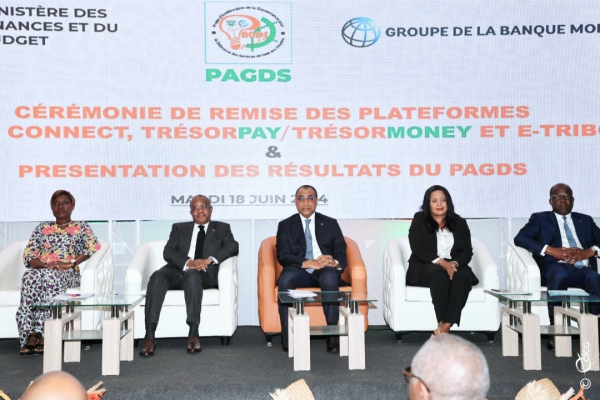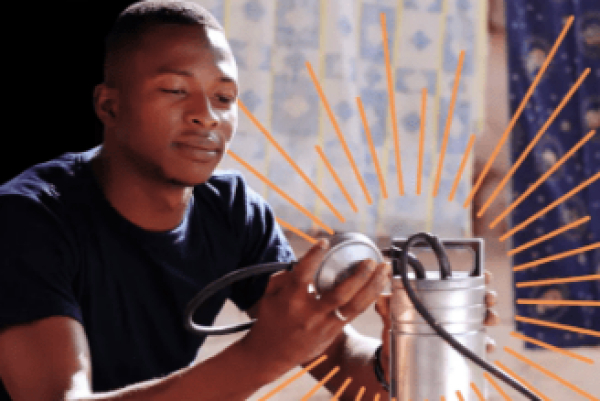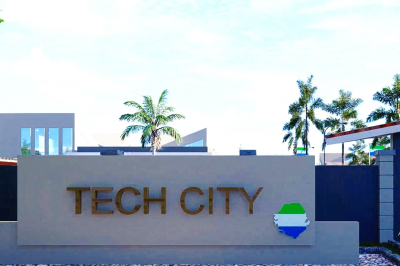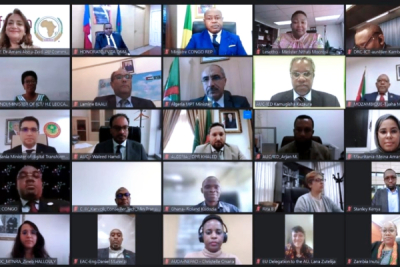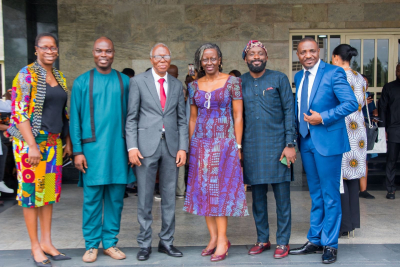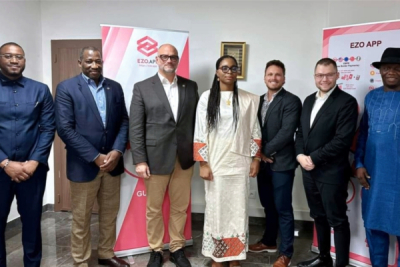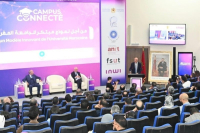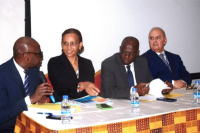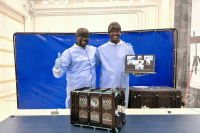
Tech (1149)
The Ivorian government is continuing the implementation of its digital development strategy for 2025. The digitization of all public services stands as a fundamental pillar of this policy.
Côte d'Ivoire's digital transformation took a leap forward on Tuesday with the launch of four digital platforms designed to streamline operations across key government ministries.
The new platforms, DOB-connect, the Hospital Information System (SIH), E-Tribcom, and Trésor-PAY-Trésor-Money, aim to enhance service delivery and transparency in education, healthcare, justice, and finance.
DOB-connect, geared towards the Ministry of National Education and Literacy, provides a digital tool for tracking student performance and tackling academic failure. The Ministry of Health received the SIH, which will improve patient care by connecting over 160 healthcare facilities.
The E-Tribcom platform streamlines judicial operations, commercial registry management, and secure transactions for the Ministry of Justice and Human Rights. Finally, the Ministry of Finance and Budget received Trésor-PAY-Trésor-Money, facilitating state expenditure management and electronic revenue collection.
The launch aligns with the Governance Improvement Project for the Delivery of Basic Services to Citizens (PAGDS), an initiative within the National Digital Development Strategy 2021-2025. This World Bank-supported strategy encompasses 32 reforms and a substantial investment of 2,000 billion CFA francs (around $3.3 billion).
The Ivorian government anticipates this digital transformation to boost GDP by 6-7 percentage points and generate between 2,000 and 3,500 billion CFA francs. The World Bank further highlights the potential of the digital economy, estimating it could contribute over $5.5 billion to Côte d'Ivoire by 2025 and exceed $20 billion by 2050, contingent on continued investments in key digital infrastructure.
Samira Njoya
In Africa, access to electricity remains a major challenge, significantly hindering economic and social development. The initiatives by Orange and its partners are contributing to addressing this challenge in a sustainable manner.
Orange Smart Energies, a specialized digital platform by the telecom operator Orange, is now open to all energy producers in Africa. This pay-as-you-go solution, combined with Orange Money, allows them to manage the prepaid electricity provided to populations through their solar kits and smart meters. This initiative will significantly enhance energy inclusion in Africa.
"Using digital technology to improve the energy inclusion of African people has been our ambition since day one. By opening up our Orange Smart Energies platform to all energy producers, we are taking a major step forward in our commitment to universal access to energy in Africa and the Middle East," said Jérôme Hénique, CEO of Orange Middle East and Africa (OMEA).
In its "Electricity 2024: Analysis and Forecast to 2026" report, the International Energy Agency (IEA) indicated that 600 million people, primarily in sub-Saharan Africa, lacked access to electricity in 2023, accounting for over 40% of Africa's population. Off-grid gasoline or diesel generators have become a common solution for accessing electricity on the continent due to their low initial costs compared to grid connection. However, their operating costs have significantly increased, particularly since 2021, following the surge in oil prices.
On the other hand, since 2015, the adoption of modular decentralized home solar systems (SHS) has steadily increased, according to the IEA. "Countries like Ghana and Kenya have multiplied their SHS capacity more than twentyfold between 2015 and 2019. SHS providers have enabled the implementation of the system through financial incentives such as a pay-as-you-go business model," notes the International Energy Agency.
Given this context, the Orange Smart Energies platform — operational in 12 African countries with over 300,000 households benefiting from its services daily — positions itself as a valuable asset for the French telecom operator in the fight against energy poverty in Africa. In addition to facilitating access to energy for remote populations, it also addresses the profitability challenges of energy producers by reducing the risk of non-payment.
Orange wants to connect one million households to solar energy by 2026. Furthermore, the company covers a dual advantage. The connection between Orange Smart Energies and Orange Money allows it to further monetize its mobile finance service, while also promoting internet usage, a strong revenue segment for Orange, through increased access to electricity.
By creating a hub that attracts regional entrepreneurs, governments can drive technological innovation across Africa, fostering a collaborative ecosystem that benefits the entire region.The project will create numerous jobs and opportunities for skills development in technology, business process outsourcing, and related fields, contributing to workforce empowerment and economic stability.
Sierra Leone is dedicating $150 million to a cutting-edge Tech City hub in Tikonko, Bo District, to transform the nation into a digital innovation powerhouse. Announced at the Orange-sponsored Sierra Leone Innovates Tech Summit (11-13 June 2024), the hub will offer facilities to incubate and accelerate programs, supporting the transition of start-ups from ideation to commercialization.
Speaking on the matter, President Bio said: “The City will foster the development of new technologies, products, and services that will serve as catalysts for sustainable development, promote economic diversification and reduce the country’s over reliance on the traditional sectors.”
The Tech City, set in a 130-acre economic zone, marks a significant step in Sierra Leone’s digital transformation efforts. Technology Minister Salima Bah, who spearheads the project, envisions the hub as a catalyst for the country’s technological advancement.
Key telecom operators Africell and Orange Sierra Leone are supporting the project, with Africell planning to establish an on-site data center, as confirmed by a memorandum of understanding (MoU) signed during the summit. The Ministry of Communication, Technology, and Innovation announced today, via their Facebook page, the signing of an MoU with Orange. This agreement paves the way for the construction of the "Orange Village" community project within the Tech and Innovation City.
The Tech City is designed to generate jobs, with new opportunities in business process outsourcing and device assembly. This multifaceted strategy aims to boost Sierra Leone’s tech capabilities and solidify its role in West Africa’s innovation landscape.
The investment comes at a crucial time as African nations increasingly leverage digital solutions to spur economic and social progress. Sierra Leone’s bold move could set a precedent, demonstrating that smaller nations can significantly impact the digital stage.
The government has been actively seeking ways to drive economic development through the combined forces of entrepreneurship, innovation, and technology. Initiatives include the Sierra Leone Medium Term National Development Plan (2019-2023), the National Digital and Innovation Strategy, and the establishment of Small and Medium Enterprises (SME) development agencies, among others.
A study by the African Development Bank (AfDB) highlights that nations with diversified economies are more resilient to global economic shocks. Sierra Leone’s investment in Tech City supports this diversification, enhancing economic resilience and creating a sustainable growth model.
Hikmatu Bilali
With the rise of artificial intelligence (AI) across the globe, African nations have a critical opportunity. They can harness AI's potential to fuel economic growth, but must also consider strategies to mitigate potential risks.
African ICT and Communication ministers have unanimously approved a Continental Artificial Intelligence (AI) Strategy and an African Digital Pact. Both documents aim to accelerate the continent's digital transformation by harnessing the potential of new digital technologies. They were approved during the second extraordinary session of the African Union's Specialized Technical Committee on Communication and ICT, held from Tuesday, June 11, to Thursday, June 13.
According to the African Union's communiqué, the Continental AI Strategy "provides guidance to African countries to harness artificial intelligence to meet Africa's development aspirations and the well-being of its people, while promoting ethical use, minimising potential risks, and leveraging opportunities."
The strategy also identifies key priorities and actions to ensure that African countries fully benefit from AI's capabilities. These include enhancing infrastructure, talent development, data institutions, innovation, and partnerships, while ensuring adequate safeguards and protection against threats.
The African Digital Pact outlines the continent's digital future and leverages the transformative potential of digital technologies to promote sustainable development, economic growth, and societal well-being across Africa. According to Amani Abou-zeid, the African Union Commissioner for Infrastructure and Energy, the pact represents the continent's strategic commitment to using digital transformation as a catalyst for inclusive progress and sustainable development in Africa.
Both documents align with the African Union's Digital Transformation Strategy (2020-2030) and Agenda 2063. Developed through consultations with a wide range of stakeholders, they represent Africa's contribution to the Global Digital Compact and the upcoming United Nations Summit on the Future in September. Before that, they will be submitted to the African Union Executive Council in July for review and adoption.
Government support for startups nurtures talent and creativity, enhancing skills in technology and entrepreneurship. These initiatives align with African development goals by addressing unemployment, poverty, and economic diversification.
The Lagos State government has allocated N1 billion ($654,000) as a seed fund for startups through the Lagos State Science, Research, and Innovation Council (LASRIC), Governor Babajide Sanwo-Olu announced on June 14.
“We are committed to increasing these success metrics with the provision of LASRIC seed fund to the tune of N1,000,000,000 – in the first tranche of funding to the council,” Sanwo-Olu said.
a SEED Fund of N1Billion was provided for this cause. This is another marquee achievement for our dear State and indeed a greater Lagos that is ever evolving. Congratulations LASRIC. 2/2 pic.twitter.com/fq8KwMNaPL
— LASRICLAGOS (@Lasriclagos) June 15, 2024
The funding was revealed during the inauguration of the newly reconstituted LASRIC members, who include experts from industry, academia, and the public sector.
For Sanwo-Olu, Lagos is a burgeoning hub for early-stage and unicorn startups, noting that the city’s startup ecosystem has outpaced many other African cities in success metrics and foreign direct investment. He also emphasized LASRIC’s achievement in securing the government’s first patent through a team from the University of Lagos, which developed the Ambu Bag Ventilator.
According to the Global Startup Ecosystem Report 2023, Lagos ranks high among African cities, attracting significant investment and producing innovative solutions. The seed fund aims to support Lagos' thriving startup ecosystem and maintain its status as a leading innovation hub in Africa.
Hikmatu Bilali
In Guinea, a large portion of its population lacks access to formal banking. To spur economic development, initiatives that improve financial inclusion are crucial.
On Tuesday, June 18, Guinea's Minister of Posts, Telecommunications, and Digital Economy, Rose Pola Pricemou (photo, center), met with a delegation from the Canadian company EZO, led by co-founder Charles-André Bergeron. The visit aimed to propose a financial solution tailored to the Guinean market, addressing the growing need for the digitalization of financial services in the country.
According to the Ministry of Digital Economy, discussions focused on the potential implementation of the EZO financial application in Guinea, the digitization of financial services, and the development of financial inclusion. Ms. Pricemou emphasized the importance of such initiatives in improving access to financial services for both rural and urban populations.
EZO's visit to Guinea is part of its international expansion strategy. The company plans to establish itself in Tunisia in the coming months and offers an automated and autonomous solution covering all financial activities. Its system comprises three main components: customer inclusion (swap system), payment, and savings. The application also allows users to receive money directly on their phones, with payment options available regardless of the currency origin.
Moreover, EZO integrates portfolio management and microcredit features, which could transform Guinea's financial landscape by offering comprehensive banking services via a digital platform.
In Guinea, the EZO delegation also met with officials from the Central Bank and other major banks to discuss solutions for providing all citizens with access to essential financial resources for their development.
Samira Njoya
The Moroccan government aims to connect educational institutions as part of its digital transformation ambitions. Starting in 2021, approximately 1.2 million SIM cards have been distributed to students, allowing them free access to the internet.
American wireless network provider Cambium Networks announced on Tuesday, June 18, the deployment of 18,000 Wi-Fi access points to provide high-speed internet connectivity in 12 major public universities in Morocco. The project covers over 200 campuses and benefits 1.3 million students, educators, and administrative staff.
The campuses are equipped with Cambium Networks' Wi-Fi 6 solutions, both indoors and outdoors. These solutions were designed and deployed in collaboration with 3GCOM, a service integrator and partner for the project. The partners integrated planning tools, contactless provisioning, streamlined installation, and centralized cloud management into the existing systems to ensure optimal performance.
The deployment of Wi-Fi access points in Moroccan universities is part of the "Connected Campus" program launched in 2021, aimed at providing students with free and secure access to digital tools. Over 1.2 million SIM cards have been distributed to students in partnership with telecom operators. This effort is part of the government's initiatives to accelerate the transformation of the higher education, scientific research, and innovation ecosystem.
"Flexible learning, online testing, and video collaboration with media-rich content requires stable, reliable and affordable performance. Our purpose-built technologies uniquely address density and scale while delivering best in class experience—ensuring uninterrupted learning while remaining affordable," said Morgan Kurk, CEO of Cambium Networks.
Isaac K. Kassouwi
The Ivorian government is intensifying its efforts to enhance the employability of young people and women through information and communication technologies (ICT). The goal is to reduce unemployment and stimulate technological innovation in the country.
The United Nations Industrial Development Organization (UNIDO), in partnership with the Ministry of Commerce and Industry and the Ministry of Digital Transition and Digitalization, launched the development of the National Industry 4.0 Strategy in Côte d'Ivoire on Friday, June 14. This initiative was introduced during a dedicated workshop.
The strategy, currently under development, will focus on skill development, support for investment and financing, and assistance to innovation and startup ecosystems to deliver 4.0 technological solutions tailored to business needs. It also emphasizes partnerships, alliances within the ecosystem, international cooperation with technical and financial partners, and awareness-raising efforts.
This initiative is part of the "Employment4Youth: Industry 4.0 to foster youth employment in Tunisia and Côte d'Ivoire" project, led by the Ivorian government and implemented by UNIDO. Launched in 2022, the project aims to increase youth employment and improve working conditions by structuring and consolidating a digital ecosystem, particularly within Industry 4.0. The project is funded by the German Federal Ministry for Economic Cooperation and Development (BMZ) under the special initiative "Decent Employment for a Just Transition."
In Côte d'Ivoire, this project is expected to create 13,000 jobs, including 3,000 direct jobs, by 2025 across various private sectors such as social and ecological transformation, renewable energies, ICT, and agro-industry, with a total investment of USD 30 million.
Samira Njoya
Cybercrime is posing a growing threat across Africa, as the continent's rapid digitalization outpaces its cybersecurity preparedness. This vulnerability exposes nations to a range of attacks, from data breaches and financial fraud to more sophisticated assaults on critical infrastructure.
The Nigerien government announced on Wednesday a new ordinance amending Law No. 2019-33 on the repression of cybercrime.
The new ordinance aims to curb the spread of disinformation and online threats , seeking to "strike a balance between freedom of expression and the protection of individual rights, while preserving public peace and security," according to the Ministry of Justice.
Promulgated earlier this month by President Abdourahamane Tiani of the National Council for the Safeguard of the Homeland in Niger, the updated legislation strengthens sanctions for online offenses. Disseminating content that disrupts public order or violates human dignity now carries a potential sentence of two to five years in prison and a fine ranging from two to five million CFA francs (approximately €3,000 to €7,600). Defamation and electronic insults can result in one to three years imprisonment and a similar fine.
Niger, like many African nations, faces a growing problem of cybercrime. During the Digital Week held from April 18 to 20, special emphasis was placed on cybersecurity. On this occasion, the Minister of Communication, Posts, and Digital Economy, Sidi Mohamed Raliou, unveiled the government's ambitions, including the establishment of a National Cybersecurity Center.
By toughening the legislation, the Nigerien government hopes to effectively combat the spread of false information, hate speech, and content inciting violence. This initiative is part of a broader strategy to enhance digital security and protect citizens from growing cyber threats.
Samira Njoya
Five years after the signing of the design protocol, Senegal’s first satellite is ready to be soon be launched into orbit.
GAINDESAT-1A, Senegal's first nanosatellite, is ready for its launch. Successfully integrated into an Exolaunch deployer in the United States, this development was revealed by the Senegalese Space Program (Sensat) on Thursday, June 13, via LinkedIn.
The 10 cm-edged nanosatellite will be launched into space in the coming days aboard a SpaceX Falcon 9 rocket. Its primary mission will be to collect data from state meteorology and water level measurement agencies, which have stations across the country.
Additionally, GAINDESAT-1A will capture satellite images of Senegal using an onboard camera. These images will serve as raw material for future developments. The satellite will take images of the country four times a day for six to seven minutes each time, over a five-year period.
This achievement is the result of a collaboration between the Senegalese government and the Space Center of the University of Montpellier (CSUM), where the satellite was designed and built by Senegalese engineers and technicians. Once in orbit, it will be monitored and controlled from Senegal, using a large control room.
With the launch of GAINDESAT-1A, Senegal will become the second Francophone sub-Saharan country, after Djibouti, to have its own satellite. In Africa, Egypt and South Africa were the first to embark on the space adventure in 1998 and 1999, respectively, followed by a dozen other countries.
Samira Njoya
More...
Intra-African trade is confronted with numerous challenges, particularly regarding the management of goods transportation. To promote the emergence of a common market, it is urgent to identify and overcome existing barriers.
On Thursday, June 13, the Djiboutian Ministry of Infrastructure and Equipment, in collaboration with Djibouti Ports Corridor Road (DPCR) and the European Union, inaugurated a digital fleet management system named "Fleet Management System." This initiative aims to enhance the efficiency of goods transportation between Djibouti and Ethiopia, marking a crucial step for regional trade.
“This modern system will allow us to better plan, manage, and the efficient flow of goods, contributing to our vision of making Djibouti a leading logistics and economic hub in Africa,” stated Aboubaker Omar Hadi, President of the Djibouti Ports and Free Zones Authority (DPFZA).
The launch of this new system is part of a strategic partnership between the European Union and the Republic of Djibouti, supporting the implementation of the Ethiopia-Djibouti Transport Corridor Project. The European Union has invested €32 million in one of the programs aimed at promoting regional economic integration in the Horn of Africa. The objective is to reduce trade costs by 10%, transit times by 15%, and customs clearance times by 30% at certain border crossing points.
The new system, which utilizes radio-frequency identification (RFID) technology, is expected to provide complete and instantaneous control of vehicle routes and transit times along the Djibouti-Ethiopia corridor. This system will also enable all logistics stakeholders to have visibility over truck movements, optimizing logistics operations and reducing waiting times at ports.
Samira Njoya
Participation in programs like the AWS Generative AI Accelerator can help African startups gain visibility on a global scale, attracting investors and partners, and ultimately driving economic growth and technological advancement in the region.
Amazon Web Services (AWS) has unveiled a $230 million investment to boost generative AI startups globally, AWS announced June 13. The move aims to accelerate innovative AI applications across sectors, supporting startups with AWS credits, mentorship, and resources.
"We'll assist startups in launching and scaling businesses, unleashing new AI applications," said Matt Wood, VP of AI Products at AWS.
The AWS Generative AI Accelerator, a 10-week program, will onboard 80 startups, offering hands-on expertise, mentorship, and up to $1 million in credits each. Applications are open until July 19.
Selected startups gain access to AWS compute, storage, and AI chips like AWS Trainium and AWS Inferentia2, plus Amazon SageMaker.
AWS's dominant 41.5% share of the cloud computing market underscores its significant influence. This level of control suggests that initiatives like the AWS Generative AI Accelerator can shape global AI innovation, including emerging markets like Africa.
Hikmatu Bilali
African countries are experiencing a substantial lag in digital development, a situation attributed to various factors. Effectively addressing these delays requires a clear understanding of these underlying issues.
Niger's Minister of Communication, Posts, and Digital Economy, Sidi Mohamed Raliou, officially launched the Digital Economy Diagnostic of Niger (Niger DE4A) on Wednesday, June 12th, in Niamey.
This initiative aims to comprehensively assess the current state of digital services penetration and usage within the country. "The evaluation will provide policymakers with actionable and prioritized recommendations to accelerate the digital transformation of Niger's government and its socio-economic landscape," emphasized the Ministry of Digital Economy.
The program, supported by the World Bank, aligns with broader efforts to assist African nations in implementing the African Union's Digital Transformation Strategy. This strategy seeks to equip every individual, business, and government body on the continent with the necessary digital skills by 2030, ultimately contributing to lifting Africa out of underdevelopment.
The digital economy diagnostic will unfold in three key phases. The first phase involves consultations with relevant stakeholders to gather essential data. This will be followed by the development of a detailed report outlining current challenges and opportunities in Niger's digital landscape. Finally, the program will propose concrete strategies and measures to maximize the country's potential for digital development.
The overall goal of the assessment is to identify and address obstacles hindering Niger's digital progress. Key challenges include insufficient technological infrastructure, limited digital skills among the population, and restrictive regulations. Overcoming these hurdles will not only enhance government efficiency but also stimulate innovation and drive economic growth in Niger.
Samira Njoya
In Côte d’Ivoire, digital talents, particularly data analysts, are among the most sought-after in the job market. To strengthen the workforce in this sector, Yango continues to pursue targeted training initiatives.
Ride-hailing platform Yango announced the expansion of its Yango Education program on Wednesday, June 12. The initiative provides free online introductory data analysis courses to Ivorian citizens aged 18 and over who have completed their basic education. The courses are designed by Yango engineers.
"This expansion allows us to offer free access to these courses to a wider community," said Kadotien Soro, Yango's National Director in Côte d'Ivoire. "We believe education is key to driving innovation and creating growth opportunities in the digital economy."
The program offers an 80-hour online data analysis course in Python and SQL, delivered over a one-month period. Yango will select over 1,500 students throughout the year through application reviews and personal interviews. Priority will be given to those aiming for careers in data analysis. The program is also open to Yango's partner drivers, couriers, and their families.
This initiative builds on Yango's commitment to fostering African entrepreneurship by equipping young people with skills to collect, analyze, and visualize data for business development. The first phase of the program benefitted approximately 250 participants.
Samira Njoya


